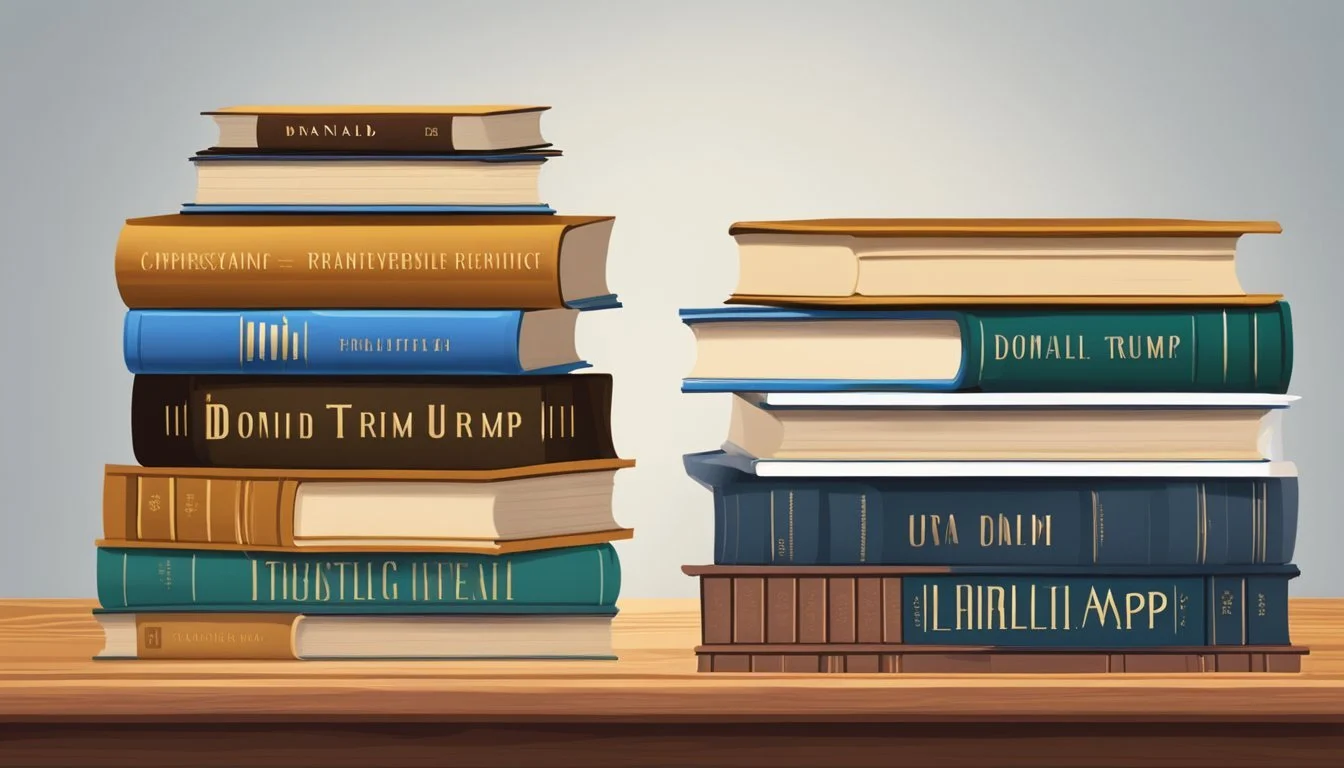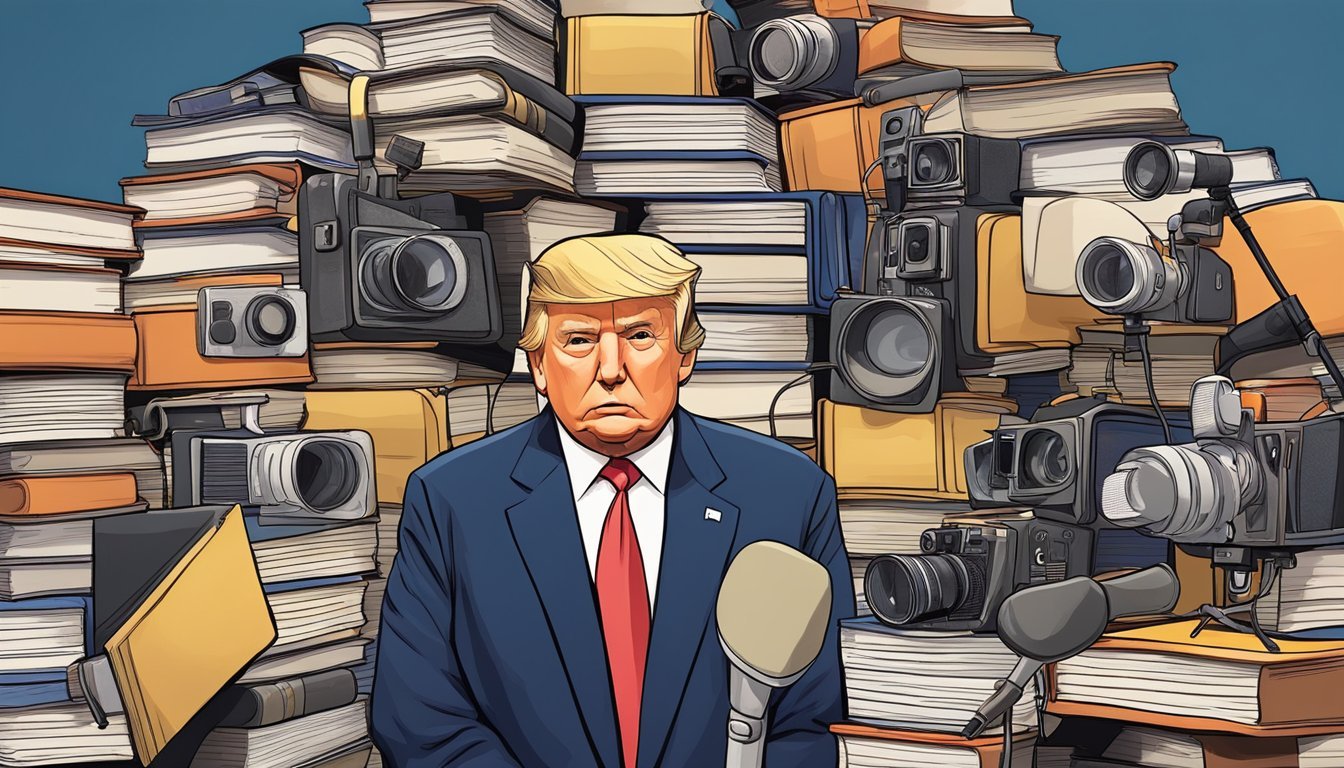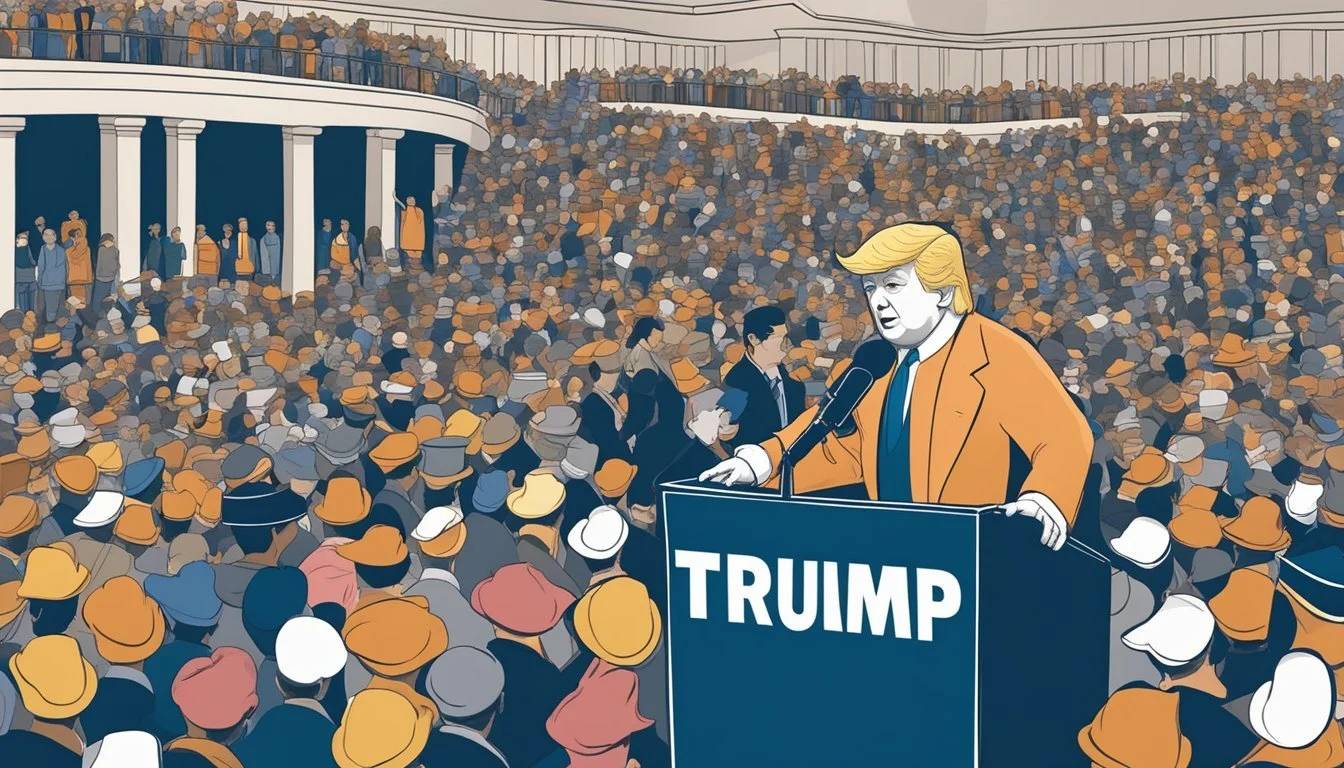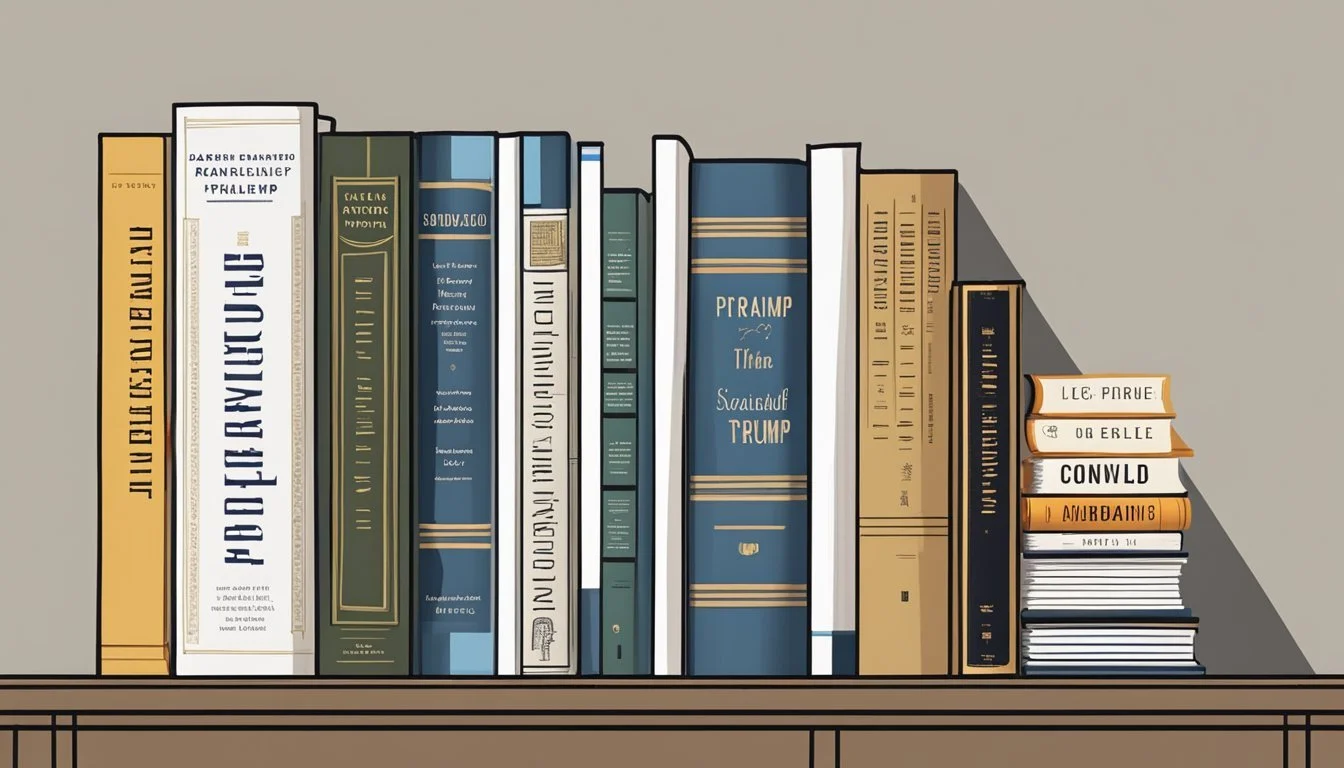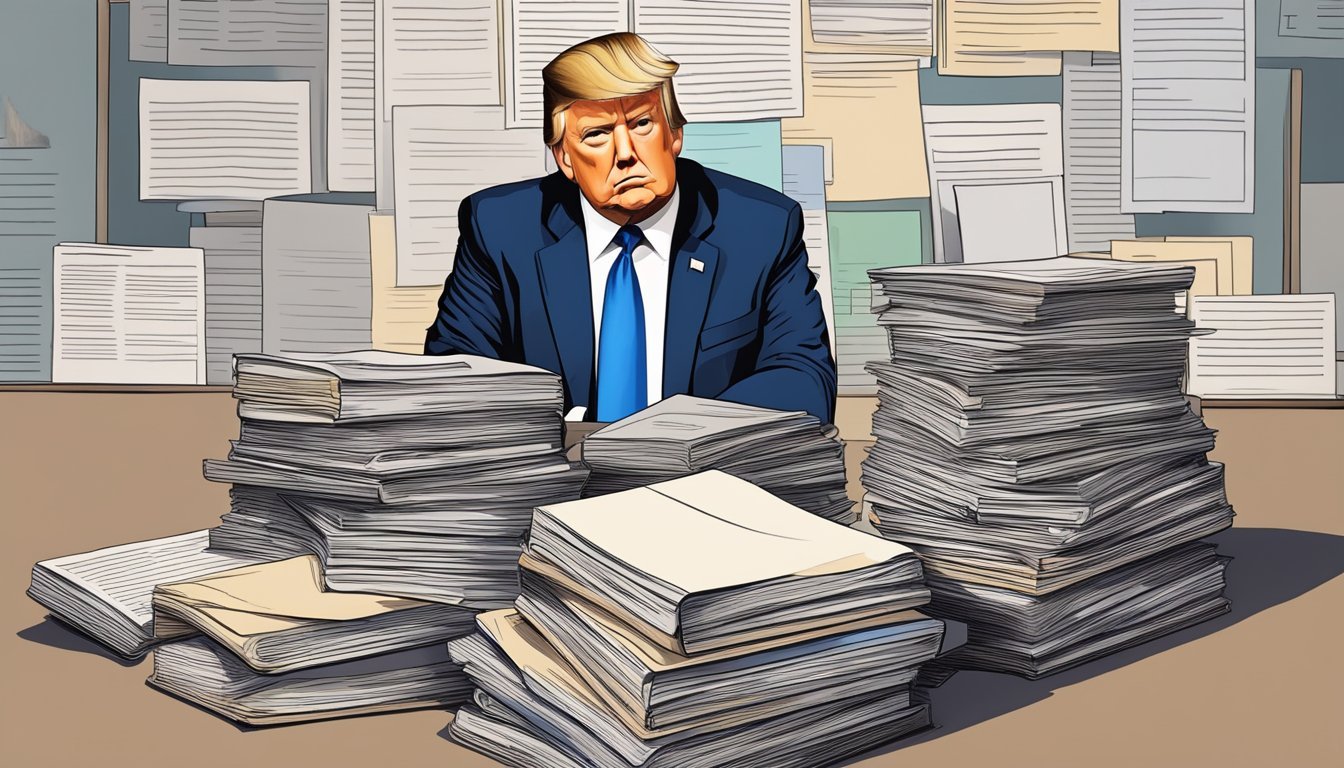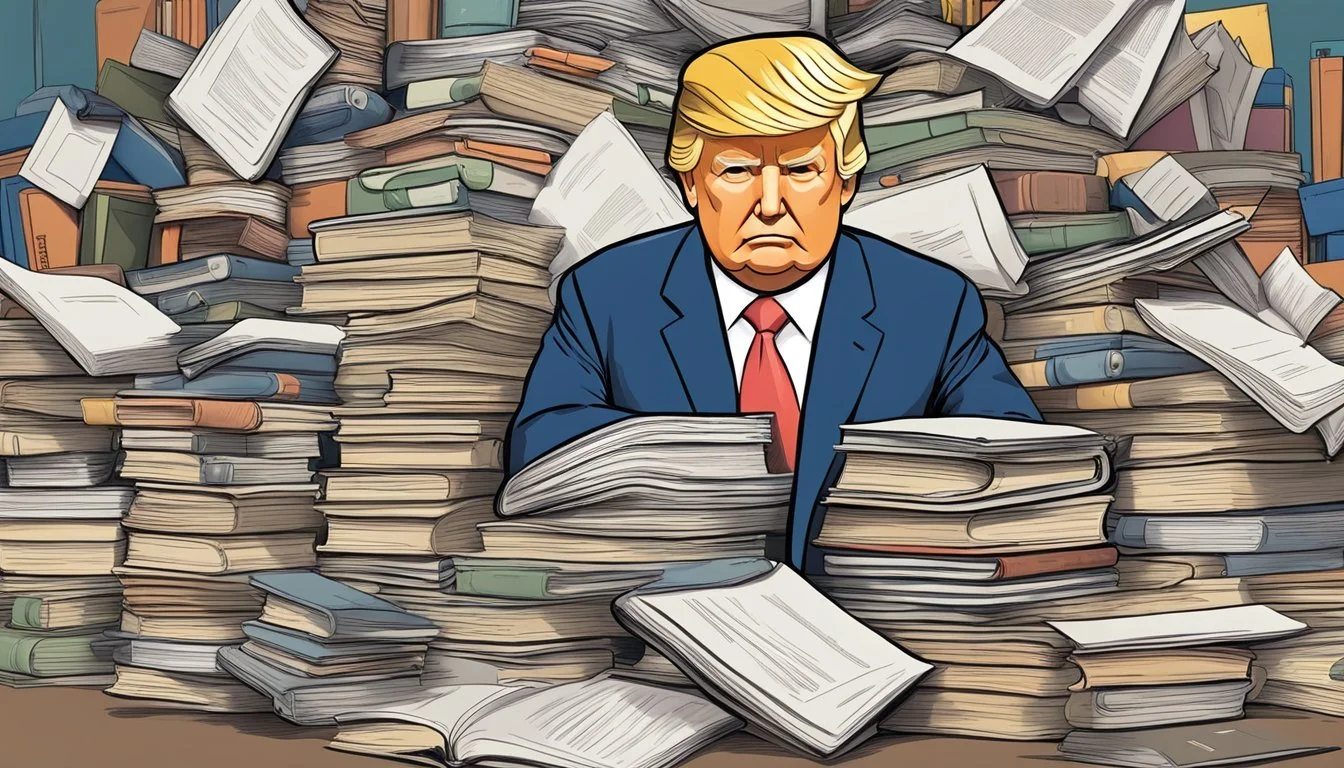Exploring the Literary World of President Trump
A Comprehensive Guide to the Former President's Literary Works
Donald Trump, the 45th President of the United States, has authored several books throughout his career as a businessman and public figure. His bibliography includes over 20 titles, with "Trump: The Art of the Deal" being his most well-known work. This 1987 bestseller provides insights into Trump's business philosophy and negotiation tactics.
As a prominent Republican Party figure, Trump's books often focus on business, politics, and his personal experiences. Some titles explore his views on leadership and success, while others delve into his political ideology and vision for America. Many of these books were published before his presidency, offering a glimpse into his mindset prior to entering the White House.
Trump's more recent publications reflect his time in office and political career. These works often present his perspective on his administration's policies and achievements. While some books are solely authored by Trump, others are collaborative efforts with ghostwriters or co-authors.
Early Life and Business Career
Donald Trump began his entrepreneurial journey in real estate while still in college. His early career was marked by ambitious projects and controversial business practices that propelled him to national prominence.
Real Estate Mogul
Trump's real estate career started in 1968 when he joined his father's company, Elizabeth Trump & Son. He quickly made his mark by renovating the Swifton Village apartment complex in Cincinnati, Ohio.
In 1971, Trump moved to Manhattan, where he became involved in larger building projects. His first major success came with the renovation of the Grand Hyatt Hotel in 1978.
Trump's most famous early project was Trump Tower, completed in 1983. The 58-story skyscraper on Fifth Avenue became a symbol of his brand and ambition.
Entrepreneurial Ventures
Beyond real estate, Trump ventured into various industries. In 1984, he opened Harrah's at Trump Plaza, a casino in Atlantic City. He later acquired additional casinos, including the Taj Mahal.
Trump's business empire expanded to include:
Golf courses
Hotels
Beauty pageants (Miss Universe)
A modeling agency
He also launched Trump University in 2005, offering real estate training programs. This venture later faced legal challenges and was shut down.
Trump Organization
The Trump Organization, founded in 1923 by Donald's grandmother and father, became the umbrella company for Trump's various business interests.
Under Trump's leadership, the organization grew significantly. It focused on:
Real estate development and acquisitions
Property management
Branding and licensing deals
Trump's children - Donald Jr., Ivanka, and Eric - joined the company in the 2000s, taking on executive roles.
The organization faced scrutiny for its business practices and potential conflicts of interest during Trump's presidency. In 2021, the company was convicted of tax fraud, marking a significant blow to its reputation.
Media Presence
Donald Trump's media presence has been extensive and influential. His reality TV career and public persona have shaped his image and helped propel him to political prominence.
The Apprentice
"The Apprentice" catapulted Donald Trump to national fame. The reality TV show premiered in 2004 on NBC and ran for 14 seasons. Trump served as host and executive producer, delivering his catchphrase "You're fired!" to contestants.
The show averaged 20.7 million viewers in its first season. It portrayed Trump as a savvy businessman and dealmaker. This image boosted his celebrity status and name recognition.
"The Apprentice" also provided Trump with significant financial gains. He reportedly earned $375,000 per episode by the final season.
Public Persona
Trump cultivated a brash, outspoken public persona long before entering politics. He frequently appeared on talk shows and news programs, offering opinions on various topics.
His use of social media, particularly Twitter, became a defining aspect of his communication style. Trump's tweets often made headlines and drove news cycles.
He authored several books, including "The Art of the Deal" in 1987. These publications further solidified his image as a successful businessman.
Trump's media savvy extended to his political career. He leveraged his celebrity status and media connections during his 2016 presidential campaign, gaining extensive coverage.
Political Career
Donald Trump's political career was marked by his unconventional approach and controversial policies. His tenure as president reshaped American politics in significant ways.
2016 Presidential Election
Trump entered the 2016 Republican primary as a political outsider. He defeated a crowded field of experienced politicians, securing the nomination with his "Make America Great Again" slogan.
Trump's campaign focused on immigration, trade, and anti-establishment rhetoric. He faced off against Democratic nominee Hillary Clinton in a contentious general election.
Despite losing the popular vote, Trump won the Electoral College. His victory stunned many political observers and pollsters who had predicted a Clinton win.
Trump Presidency
Trump's presidency was characterized by major policy shifts and frequent controversies. He implemented tax cuts, appointed conservative judges, and pursued an "America First" foreign policy.
Key initiatives included:
Building a wall on the U.S.-Mexico border
Travel bans on several Muslim-majority countries
Withdrawal from the Paris Climate Agreement
Renegotiation of trade deals like NAFTA
Trump faced two impeachment trials but was acquitted by the Senate both times. His unconventional communication style, often via Twitter, kept him constantly in the headlines.
2020 Presidential Election
Trump ran for reelection in 2020 against former Vice President Joe Biden. The COVID-19 pandemic dominated the campaign, with Trump's handling of the crisis under scrutiny.
Biden won both the popular vote and Electoral College. Trump disputed the results, claiming widespread voter fraud without evidence. His refusal to concede led to growing tensions.
On January 6, 2021, Trump supporters stormed the U.S. Capitol in an attempt to overturn the election results. This insurrection marked a chaotic end to Trump's presidency and led to his second impeachment.
Books by Donald Trump
Donald Trump has authored numerous books on business, politics, and personal success. His works offer insights into his thinking and strategies across various domains.
The Art of the Deal
Published in 1987, "The Art of the Deal" is Trump's most well-known book. Co-written with journalist Tony Schwartz, it presents Trump's business philosophy and recounts his real estate deals. The book spent 48 weeks on The New York Times Best Seller list.
Trump shares anecdotes from his career and offers advice on negotiation tactics. He emphasizes the importance of thinking big, trusting one's instincts, and using leverage in deals.
The book's success helped cement Trump's public image as a savvy businessman and dealmaker. It has sold over one million copies since its release.
The America We Deserve
Released in 2000, "The America We Deserve" outlines Trump's political views and policy proposals. The book was written when Trump was considering a presidential run with the Reform Party.
Trump discusses issues like education, healthcare, and foreign policy. He advocates for universal healthcare, proposes a one-time 14.25% tax on the wealthy, and warns about the threat of terrorism.
The book provides early insight into Trump's political positions, some of which evolved by the time of his 2016 presidential campaign. It showcases his interest in politics long before his eventual run for office.
Midas Touch
Co-authored with Robert Kiyosaki in 2011, "Midas Touch" combines Trump's real estate expertise with Kiyosaki's financial literacy focus. The book aims to teach readers how to build wealth through entrepreneurship.
Trump and Kiyosaki present five "Midas Touch" attributes: strength of character, F.O.C.U.S. (Follow One Course Until Successful), brand, relationships, and little things that count.
They share personal stories and business lessons, emphasizing the importance of financial education and entrepreneurial thinking. The book encourages readers to develop skills beyond traditional employment.
Crippled America
Published in 2015 during his presidential campaign, "Crippled America" (later retitled "Great Again") presents Trump's vision for the country. The book outlines his policy positions and critiques of the Obama administration.
Trump covers topics like immigration, healthcare, and foreign policy. He proposes building a wall on the Mexican border, repealing the Affordable Care Act, and renegotiating trade deals.
The book serves as a campaign manifesto, articulating Trump's "Make America Great Again" platform. It provides insight into the policies he would pursue as president and his perspective on America's challenges.
Books About Donald Trump
Numerous books have been published examining Donald Trump's presidency and life. These works offer varying perspectives from journalists, insiders, and academics.
Journalistic Accounts
Bob Woodward's "Fear: Trump in the White House" and "Rage" provide detailed accounts of the Trump administration. Woodward's reporting relies on extensive interviews and insider sources.
Michael Wolff's "Fire and Fury" became a bestseller, offering a controversial look at the early days of Trump's presidency. The book sparked debate over its accuracy and sourcing.
Maggie Haberman's "Confidence Man" draws on her years of reporting on Trump for The New York Times. It explores his rise to power and impact on American politics.
Insider Perspectives
John Bolton's "The Room Where It Happened" offers a firsthand account from Trump's former National Security Advisor. The memoir details policy disagreements and Bolton's views on Trump's decision-making.
Peter Strzok's "Compromised" provides insights from the former FBI agent's perspective. Strzok led the investigation into Russian interference in the 2016 election.
Michael S. Schmidt's "Donald Trump v. The United States" examines key moments of the Trump presidency through the lens of legal and institutional challenges.
Historical and Scholarly Analyses
Academic works have placed Trump's presidency in historical context. These books analyze his impact on American politics, institutions, and society.
Some scholarly works focus on specific aspects of Trump's tenure, such as his communication style or policy decisions. Others examine broader themes like populism and polarization.
Certain analyses compare Trump to past presidents or explore his influence on the Republican Party. These books aim to provide a more detached, analytical perspective on his time in office.
Controversies and Legal Matters
Donald Trump's presidency and business career have been marked by numerous legal challenges and controversies. These range from impeachment proceedings to lawsuits over his business practices and questions about his financial disclosures.
Impeachment Proceedings
Trump faced two impeachment trials during his presidency. The first, in 2019, centered on allegations of abuse of power and obstruction of Congress related to his dealings with Ukraine. The House of Representatives voted to impeach, but the Senate acquitted him in February 2020.
The second impeachment occurred in January 2021, following the Capitol riot. Trump was charged with incitement of insurrection. He was impeached by the House but again acquitted by the Senate after leaving office.
These historic proceedings highlighted deep political divisions and raised questions about presidential conduct and accountability.
Trump University Case
Trump University, a real estate training program, became the subject of multiple lawsuits. Former students alleged fraud, claiming the program did not deliver on its promises of success in real estate.
In 2016, Trump agreed to settle three lawsuits for $25 million without admitting wrongdoing. The settlement included reimbursement for students and $1 million in penalties to the state of New York.
This case drew significant attention during Trump's 2016 presidential campaign and raised concerns about his business practices.
Tax and Financial Disclosures
Trump's tax returns and financial disclosures have been a source of ongoing controversy. Unlike previous presidents, he refused to release his tax returns while in office, citing an audit.
In 2020, The New York Times reported that Trump paid only $750 in federal income taxes in 2016 and 2017. This revelation sparked debates about tax avoidance and the fairness of the tax system.
Trump's financial disclosures have also faced scrutiny, with questions raised about potential conflicts of interest between his business empire and his role as president.
Policies and Impact
Donald Trump's presidency was marked by significant policy shifts across domestic and international spheres. His administration pursued an agenda focused on deregulation, tax cuts, and an "America First" approach to foreign policy.
Domestic Policies
Trump's domestic agenda centered on deregulation and conservative judicial appointments. He rolled back environmental protections, including withdrawing from the Paris Climate Agreement. The administration implemented stricter immigration policies, attempted to repeal the Affordable Care Act, and passed the Tax Cuts and Jobs Act of 2017.
Trump appointed three Supreme Court justices, shifting the court's ideological balance. His response to the Covid-19 pandemic faced criticism for downplaying the virus's severity and conflicts with public health experts.
Foreign Relations
Trump's "America First" foreign policy led to significant changes in international relations. He pursued a hardline stance on China, engaging in a trade war and blaming Beijing for the Covid-19 outbreak.
The administration withdrew from several international agreements, including the Iran nuclear deal and the Trans-Pacific Partnership. Trump met with North Korean leader Kim Jong-un, marking a shift in diplomatic approach.
Relations with traditional allies were strained at times, with Trump criticizing NATO members and renegotiating trade deals like NAFTA.
Economic Initiatives
Trump's economic policies focused on tax cuts, deregulation, and protectionist trade measures. The Tax Cuts and Jobs Act reduced corporate tax rates and temporarily lowered individual rates.
The administration imposed tariffs on various imported goods, particularly from China, aiming to protect American industries. Trump's tenure saw low unemployment rates and stock market gains, though the Covid-19 pandemic led to significant economic disruption in 2020.
Trump's approach to economic policy, often termed "Trumpism," emphasized nationalist economic principles and skepticism of globalization.
Legacy and Influence
Donald Trump's presidency left a significant mark on American politics and society. His unconventional approach and polarizing rhetoric reshaped public discourse and party dynamics.
Public Opinion
Trump's approval ratings fluctuated throughout his term. His base remained loyal, while opposition grew more vocal. Polls showed a deeply divided electorate.
Trump's use of social media, particularly Twitter, changed how presidents communicate. His frequent tweets bypassed traditional media channels.
His "America First" policy shifted U.S. foreign relations. Trade wars and renegotiated agreements altered global dynamics.
Support Base and Trumpism
"Make America Great Again" became a rallying cry for Trump supporters. The slogan encapsulated a nostalgic vision of American prosperity and strength.
Trumpism emerged as a political movement. It blended populism, nationalism, and anti-establishment sentiment.
Trump's base included rural voters, working-class whites, and evangelical Christians. His appeal crossed traditional party lines in some regions.
The movement challenged Republican Party norms. It prioritized issues like immigration restriction and trade protectionism.
Post-Presidency Role in Politics
Trump maintains influence in the Republican Party post-presidency. He endorses candidates and shapes party platforms.
His claims of election fraud in 2020 continue to resonate with supporters. This narrative impacts voter confidence in electoral processes.
Trump's potential future candidacy looms over Republican primaries. It affects fundraising, messaging, and candidate strategies.
His ongoing legal challenges keep him in the public eye. They fuel both support from his base and criticism from opponents.
Cultural and Social Reception
Donald Trump's presidency and persona sparked intense reactions across American society. His unconventional style and policies elicited strong responses in literature, art, media, and public sentiment.
In Literature and Art
Authors and artists responded to Trump's presidency through various works. Novels like "The Plot Against America" by Philip Roth gained renewed attention for their themes of authoritarian leadership. Political cartoonists depicted Trump in exaggerated forms, often highlighting his distinctive hairstyle and facial expressions.
Visual artists created provocative pieces, such as the inflatable "Trump Baby" balloon flown at protests. Street art and murals featuring Trump appeared in cities worldwide, reflecting diverse viewpoints on his leadership.
In Media Commentary
Trump's presidency dominated news cycles and commentary. Late-night talk shows frequently targeted his statements and policies with satirical sketches. Political pundits debated his actions extensively on cable news networks, often along partisan lines.
Social media platforms became battlegrounds of opinion, with Trump's own Twitter account serving as a direct channel to supporters and critics alike. Fact-checking organizations saw increased prominence as they analyzed Trump's claims.
Public Sentiment
Trump's tenure polarized public opinion. His supporters praised his outsider approach and economic policies. Critics organized large-scale protests, including the Women's March following his inauguration.
The "Resist" movement gained traction among Trump opponents, spawning grassroots activism and voter mobilization efforts. Debates over racism and divisiveness in American politics intensified during his term.
Public sentiment fluctuated with events like the COVID-19 pandemic and the January 6th Capitol attack, shaping perceptions of Trump's legacy in the American republic.
Personal Accounts and Memoirs
Numerous books provide firsthand perspectives on Donald Trump's presidency and business career. These works offer insights from various angles, including those close to Trump and Trump himself.
Memoirs by Associates
Michael Cohen's "Disloyal: A Memoir" offers a critical view of Trump from his former personal attorney. Cohen describes Trump as racist, sexist, and dishonest. Sean Spicer and Cliff Sims, both former White House staffers, published their own accounts of working for Trump. These memoirs often present contrasting views, with some portraying attempts to manage Trump and others defending his actions.
Trump's Own Writings
Donald Trump has authored several books about his life and career. "Trump: The Art of the Comeback" details his recovery from financial difficulties in the 1990s. "Trump: Surviving at the Top" focuses on his business strategies and personal philosophy. More recently, "Our Journey Together" and "Letters to Trump" showcase Trump's presidency and correspondence. These works present Trump's perspective on his achievements and leadership style.

